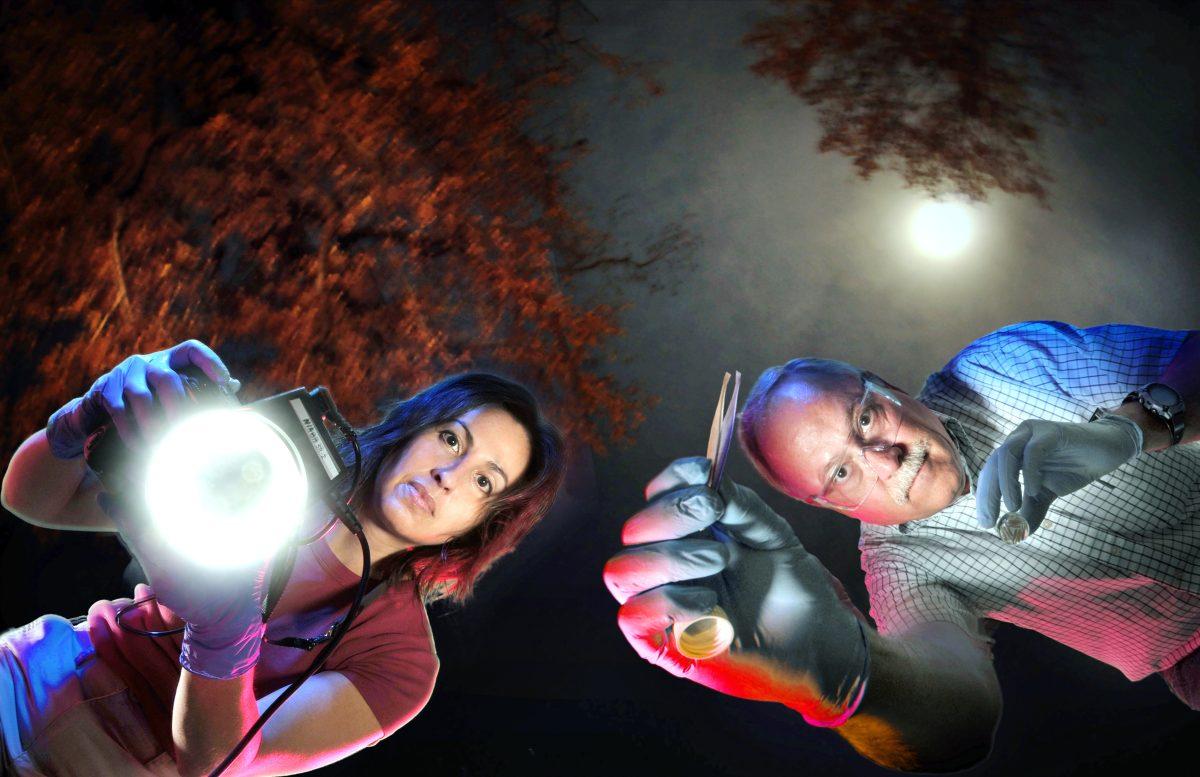 Ann Ross, a professor of anthropology, and Wes Watson, a professor of entomology, work together to examine a crime scene." />
Ann Ross, a professor of anthropology, and Wes Watson, a professor of entomology, work together to examine a crime scene." />
Photo courtesy of Roger Winstead
Ann Ross, a professor of anthropology, and Wes Watson, a professor of entomology, work together to examine a crime scene.
Forensic science careers, made popular by shows like CSI, are getting much closer to becoming a reality for more N.C. State students.
The University is looking to add a forensic science master’s or doctorate program in the near future, according to Wes Watson, professor of entomology. The program, a branch of N.C. State’s Forensic Sciences Institute, is currently awaiting approval from the UNC Board of Trustees, which may take a year or longer.
Watson explained that various areas of study, including geology, textiles, anthropology and entomology, make “really important contributions to forensic sciences” in their own way.
Geologists, for example, can look at pieces of gravel in a tire tread and identify where the rocks came from, which can help determine where the vehicle has been or where it was from originally.
People working with textile chemistry can examine fibers found at a crime scene and ascertain information about the fibers, including who they originally belonged to or where they were manufactured.
Entomologists, like Watson, can identify insects that have colonized on a body and use their knowledge of the insect’s life cycle to establish a possible time of death.
“The Forensic Sciences Institute aim s to build a new core of forensic science professionals from all disciplines,” said David Hinks, Cone Mills professor of textiles chemistry and director of the University’s Forensic Sciences Institute.
The new program will allow faculty and students to work together to conduct research and increase students’ knowledge of the field.
Hinks said the program is looking to bring in “four high-profile faculty members from interdisciplinary areas” thanks to the Chancellor’s Faculty Excellence Program, which aims to enhance safety and security at N.C. State. The forensic science program is relevant to the program because it applies forensic sciences to the law.
At the Forensic Sciences Institute, Hinks, Watson and other professionals assist medical examiners and contribute to case work of real crime cases. The goal of the institute is to establish an accredited program in North Carolina. According to Hinks, there are not currently any accredited forensic science programs in North Carolina, South Carolina, or Tennessee.
Hinks explained that the reason a bachelor’s degree program will not be offered is because companies in the forensic science industry are looking for graduates with strong bachelor’s degrees in a science, like chemistry and advanced degrees in forensic science.
In the program, graduate students will likely be able to work with real-life case materials, a common practice at established institutions, like Texas A&M, according to Watson. The practice and training students will receive will make them valuable assets to employers, Watson said.
In the past, anthropology graduates from N.C. State have gone on to work in a wide variety of careers.
“N.C. State has had anthropology graduates who have been hired by crime laboratories and some students have even gone on to work for the FBI,” Hinks said.
Until the Institute is formally recognized and approved, students can still be involved with forensic science by pursing a forensic science minor or a bachelor’s degree in a topic that concentrates on forensic science interests, like polymer and color chemistry.
There are currently more than 60 students pursuing a minor in forensic science at the University. The minor incorporates a variety of classes ranging from chemistry to anthropology and entomology in addition to specialized training for work in forensic sciences, said Watson.
Those interested in forensic sciences can also attend N.C. State’s Forensic Science Symposium, a conference held each year in December. The seminar features speakers from various disciplines in the forensic science field, including statistics, chemistry and biology. Those involved in science, engineering, industry, education and law enforcement, are invited to attend the symposium each year.